QuestionMy cat Phil licks himself obsessively,He used to have many bald spots on him that made him look shaved. We took him to the vet and the vet said it could be allergy, skin infection or anxiety. Then the next time we took him to the vet, the vet got out a book and fond the problem that it is a licking problem due to anxiety. There were all these antibiotics that might help. The number 1 choice was (that they didn't mention but was in the book) to put an Elizabethan Collar on him. *Let's cut to the chase* My mom takes it of him to go out side an sit on the patio, she says he needs to have a wash but every time he goes out he obsessively licks himself like 10 time.
AnswerKara,
I don't believe in the Elizabethan collars. I think they stress a cat more because if it is a skin problem it can make them crazy because they have an itch they can't scratch, plus they are awfully uncomfortable. The problem needs to be dealt with. A collar prevents the action but doesn't do anything to help cure it.
Obsessive licking can be an emotional or a medical issue. I would take him to another vet that is familiar with obsessive-compulsive behavior and allergies (and doesn't have to look up anything) to determine which it is and be given the correct medication for the problem. The cat can be given anti-anxiety medications. If a trial dose of steroids controls excess grooming, the condition is probably medical and not psychogenic in origin.
Some possible medical conditions are cystitis, inflammation of anal sacs, hyperthyroidism, allergies or hypersensitivity to parasites, food, dust, pollen, or mold. The cat may have Flea Dermitis which is an allergy to flea saliva. It can be from only one flea! Prednisone (oral or injection) is commonly used. You may want to put Advantage Plus, etc. flea protection on the cat.
Compulsive over-grooming behavior is called Psychogenic Alopecia. Hair loss is generally on areas only accessible to the cat such as the abdomen, flank, back, chest, and legs. It is a way to reduce emotional tension due to psychological reasons such as stress, nervousness, fear or anxiety. It is more common in purebred cats of Oriental breeds.
You can try and determine the cause of the cat's anxiety and/or stress and if possible eliminate it. Often though you may not be able to figure out the exact cause because if he is the nervous type, he will react the same way to any cause of stress to him. Even you arguing with someone may stress him. If that is the case anti-depressant or anti-anxiety medication (like the kitty Prozac) is prescribed to keep the psychogenic behavior in check. Sometimes, as with people, it can take a few weeks to begin to work on the cat.
Clomipramine has been effective in controlling the signs of anxiety-related and obsessive-compulsive disorders in cats and was well tolerated. The average maintenance dosage was 0.3 mg/kg once daily. You may wish to ask your vet about it.
You can try channeling his attention away from himself by keeping him mentally occupied. There are cat videos on VHS/DVD that you can play for him. I have some and my cat LOVE THEM! Here is the link where you can get them: http://petsittervideos.com/index.html
Or get an aquarium or gerbil/mice in cages for him to watch and try to 'catch'. A pet laser light (from Petco, PetSmart, etc.) is also a great interactive toy that both of your cats would love. They can chase the little red 'bug' on the floors, walls, and ceilings.
A kitty companion may help if the cat's problems stem from boredom.
For further information about cat allergies here is a good article from CATS Magazine, April 1992, pertaining to cats with allergies:
"Cats can suffer from a wide range of allergies. A cat with one allergy often has others. 15% of all cats in the U.S. suffer from one or more allergies.
Cats' allergies fall into several categories, each with a parallel complaint among human allergy sufferers. Inhalant allergies are caused by airborne articles, such as pollen, that irritate the nasal passages and lungs. Contact alllergies manifest themselves when the cat has prolonged contact with a substance that it just cannot tolerate. Cats have allergies to foods as well -- not so much to the chemical preservatives but to the grains, meats and dairy products used. Some cats react badly to certain drugs, such as antibiotics or anesthesia.
Flea allergy is the most common of all allergies. As cats age, their sensitivity to flea bites increases. Prednisone (oral or injection) is commonly used for a bad reaction.
Between 5 & 10 percent of allergy cases are caused by food. Like contact allergies, food allergies will show up as dermatitis and severe itching but in some cases will also cause vomiting and diarrhea. Also, the cat may have excessively oily skin, ear inflammation, or hair loss (which can also be a sign of hormone imbalance). A food allergy doesn't show up overnight. It can take from a week to 10 years of exposure to show itself; more than 80 percent of cats with food allergies have been eating the allergen-containing food for more than two years.
Food allergies are treated with a bland, hypoallergenic diet -- rice with boiled chicken or lamb, and distilled water is commonly used. Two weeks is the longest it usually takes for the bland diet to work.
Causes, symptoms, and treatments of some types of allergies:
Plants, especially oily-leafed ones, such as rubber plants, that might be brushed against. Other contact allergens include: carpet fresheners, wool, house dust, newsprint, cleansers and topical medications. Even the carpet itself. Signs of contact allergens: dermatitis, pigmentary changes or skin eruptions. Most noticable on the chin, ears, inner thighs, abdomen, underside of the tail, armpits and around the anus. Skin patch tests are used to determine cause of contact allergies.
Medications that commonly cause skin eruptions: penicillin, tetracycline, neomycin and panleukopenia vaccine.
Each drug causes different symptoms, but the symptoms differ from cat to cat. There is no way to predict how a cat will react.
Antihistamines or steroids may be used to eliminate symptoms (after ceasing administration of the drug)
Kitty litter - when new brands of litter come out, vets frequently see a number of cats that have reactions to it. Other inhalant allergies can include: dust from the furnace esp. when it is first turned on; cigarette smoke; perfumes; household sprays and air freshners; pollen. Inhalent allergies can also result in skin loss, scabbing pustules, or ulcerated areas on the skin. This in addition to the asthmatic symptoms. Treatment uses...antihistamines, such as chlortrimetron.. More severe cases are treated with systemic steroids, which can have drawbacks"
I hope this helps!
Tabbi

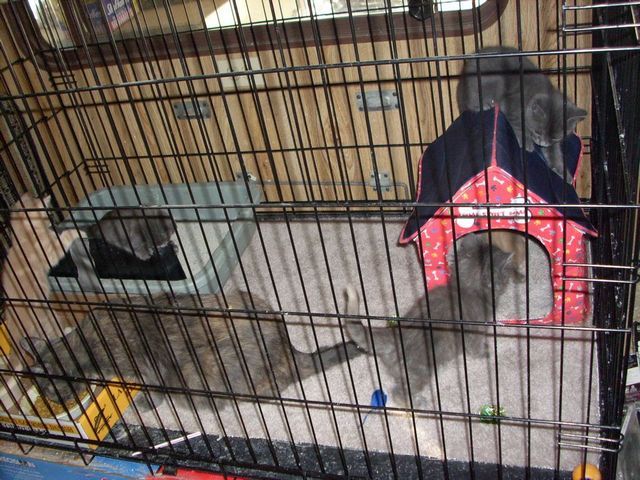 Cats behaviour
QuestionHi my parents bought a male ragdoll cat who is
Cats behaviour
QuestionHi my parents bought a male ragdoll cat who is
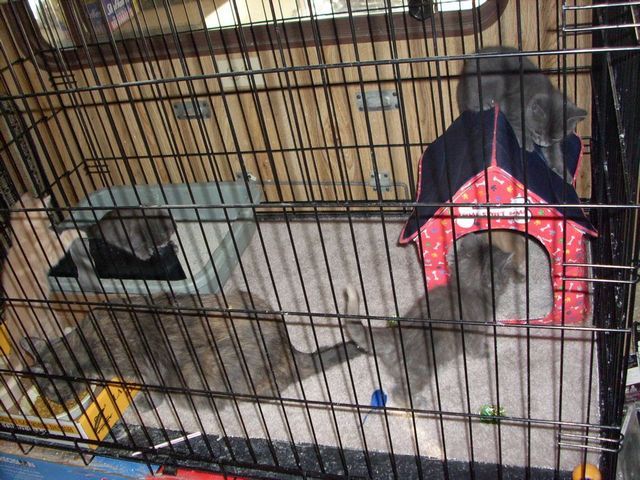 new cat/ old cat
QuestionI have 2 cats that I got from the same litter w
new cat/ old cat
QuestionI have 2 cats that I got from the same litter w
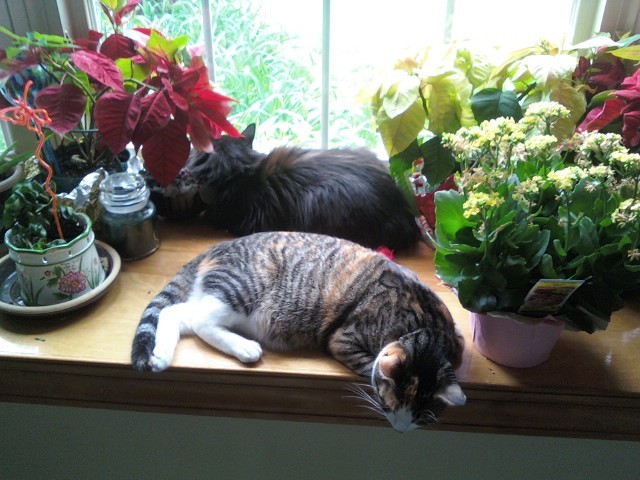 Young female cat TORMENTS our older female! :(
QuestionMy Kitties
QUESTION: Hi, I really need s
Young female cat TORMENTS our older female! :(
QuestionMy Kitties
QUESTION: Hi, I really need s
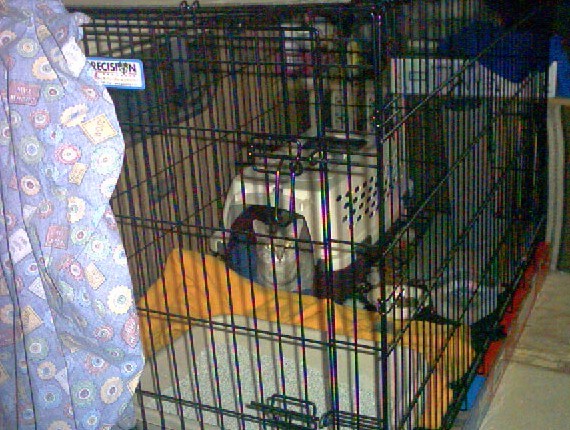 Older Kitten Attacking Younger Kitten
QuestionI just brought home a kitten that is 7 weeks ol
Older Kitten Attacking Younger Kitten
QuestionI just brought home a kitten that is 7 weeks ol
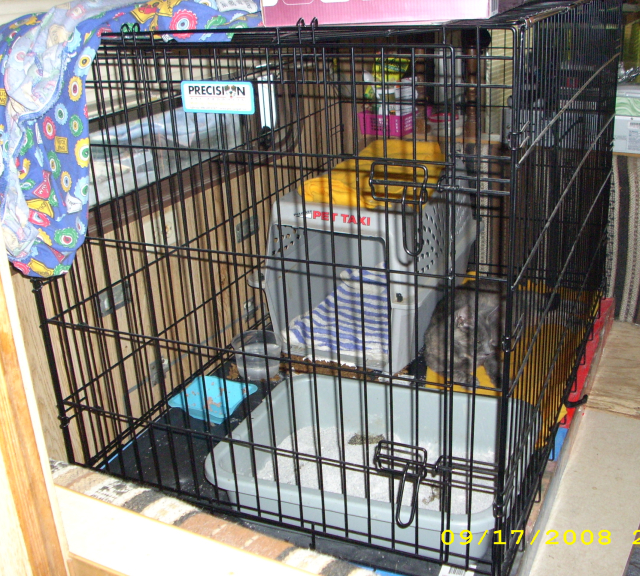 Assimilating a disabled cat into our home
QuestionDear Tabbi,
My husband and I share our home wit
Assimilating a disabled cat into our home
QuestionDear Tabbi,
My husband and I share our home wit